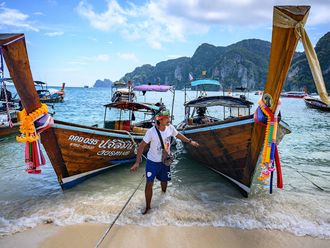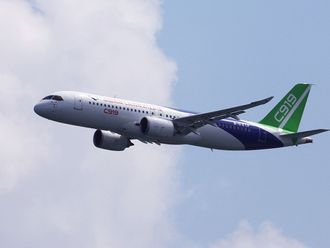Beijing: China has opened a state-of-the-art film theatre on disputed Woody Island in the South China Sea’s Paracel group in an effort to improve quality of life for the roughly 200 civilians and military personnel on the tiny land mass.
The Yinlong Cinema that opened Saturday is China’s southernmost permanent standing film house, according to Chinese media reports. It’s the latest in a series of measures aimed at establishing a more concrete presence in the South China Sea, which China claims virtually in its entirety.
The chairman of the Hainan Media Group, Gu Shaoqing, was quoted in media reports as saying the Yinlong, or “Silver Dragon,” would show at least one feature daily.
“In this way, island residents can enjoy the same cinema service enjoyed by people in other parts of China,” Gu was quoted as saying.
The theatre can show movies in 3-D and its equipment is portable, allowing it to be transported to other nearby islands as needed.
Taiwan and Vietnam also claim the 2.6-square kilometre island, known as Yongxingdao in Chinese, the largest in the Paracel group, which lies to the north of the even more hotly contested Spratly chain.
Earlier this month, the US Navy destroyer USS Stethem sailed within 12 nautical miles (32 kilometres) of Triton Island in the Paracel Group in an operation affirming the right to passage and challenging what the US considers China’s excessive territorial claims in the area. China accused the US of trespassing in its territorial waters and sent ships to intercept the destroyer.
Chinese Foreign Minister Wang Yi said on Monday Beijing wanted to maintain stability in the South China Sea as it seeks alliances in the region amid tensions in the disputed waters.
The United States has criticised China for disregarding international law by the construction and militarisation of artificial islands in the South China Sea, undermining regional stability.
China claims most of the energy-rich sea through which about $5 trillion (Dh18.36 trillion) in ship-borne trade passes every year. Neighbours Brunei, Malaysia, the Philippines, Taiwan and Vietnam also have claims.
Thailand is not a claimant state in the dispute and has maintained a neutral stance on the topic.
Addressing the South China Sea issue, Wang, on an official visit to Bangkok, told reporters China would like to “maintain stability in the South China Sea, abiding by the terms that have been agreed on the Declaration of Conduct and Code of Conduct in near future”.
China and Southeast Asian countries agreed in May to a framework for a long-proposed code of conduct for the disputed waters.
Wang’s visit comes ahead of a regional meeting of Southeast Asian countries in Manila next month.
“China and Thailand are like brothers,” Wang said.
Thai Foreign Minister Don Pramudwinai praised Thai-Chinese relations, saying there were “no obstacles” to the relationship between the two.
Thailand this year has approved Chinese submarines, tank and helicopter purchases worth more than $500 million.
Last month, Thailand approved the construction of the first phase of a $5.5 billion railway project to link the industrial eastern seaboard with southern China through landlocked Laos, part of China’s One Belt One Road regional infrastructure drive.
The project, which has been held back by delays, was pushed through after junta chief Prayuth Chan-ocha invoked an executive order known as Article 44.
Wang said he hoped the rail project would “elevate” Thailand’s status in the region and said that the two countries would overcome differences to bring the rail project to fruition.












